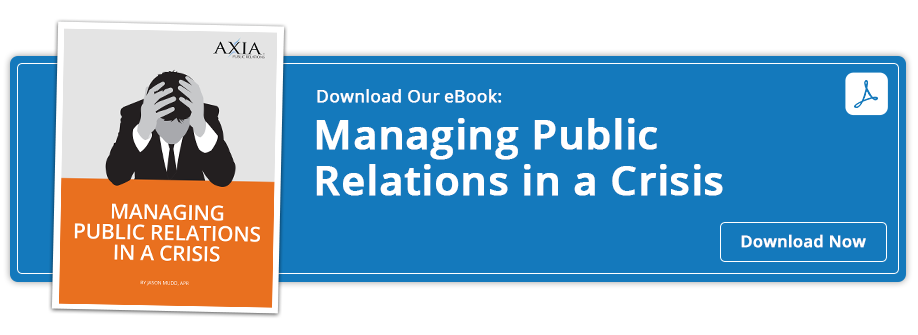 Learn why your company needs social media channels for effective crisis communication
Learn why your company needs social media channels for effective crisis communication
General Motors CEO Mary Barra apologized for the disaster surrounding GM’s faulty ignition switches. Domino’s Pizza CEO Patrick Doyle expressed regret after two employees created a disgusting YouTube video prank featuring nothing you would ever want on a pizza. But was this enough?
For years, public relations practitioners have advised that the best strategy after a crisis is to apologize quickly and sincerely. However, in today’s constantly connected society, even the smallest crisis can take on a life of its own, dragging your company’s reputation along for the ride. Since PR crises have evolved, crisis communication must follow suit. Your company may need social media channels to manage it all, and you can rely on PR to help.
Benefits of using social media during a crisis
Many companies believe they don’t need a crisis management plan, preferring to simply handle matters as they happen. The truth is that during a crisis, you will need every trick and tool at your disposal. One of the most crucial tools is social media.
- The delivery method matters just as much as the message itself. Social media allows your customers and employees to spread their reviews and opinions worldwide in seconds. You can do the same with your crisis communication.
- Social media hits appear in search rankings. When people Google your company during a crisis, you want the results they find to be positive. You can exert some control over this by making sure you respond to complaints and negative information related to the crisis quickly, using social media.
- Having a social media channel will allow you to reach consumers where they are. If you are already engaging and communicating with customers through social media, this is likely where they will look for your response during a crisis. These are probably your biggest fans, and it’s vital to let them know what’s going on so they can help you.
Why your company should apologize in the event of a crisis
- People expect an apology when they are wronged, even if the issue was not directly your fault. For instance, Johnson & Johnson, the makers of Tylenol, apologized when seven people died as a result of cyanide-laced pills. They could not have reasonably prevented this issue and they did not cause it, but they took the blame and initiated steps to fix the problem.
- You are essentially apologizing to everyone. Although you may be directing your mea culpa at those who were immediately affected, others are listening. This includes shareholders, prospects and employees.
- Apologizing now can help you avoid a bigger crisis later. When your company discovers a problem, admits mistakes and explains how things will improve, it allows you to control the narrative and potentially shorten the lifespan of the crisis.
Why help from PR is vital
When a crisis occurs, top management, lawyers and PR representatives may begin to argue about the best way to handle it. It’s important that everyone works together for the most ideal outcome.
You must strike a balance between getting information out quickly and ensuring you don’t say anything that can hurt you later during possible litigation. Keeping your messages consistent throughout the crisis will improve your chances for survival.
Axia Public Relations can help you use social media for reputation management, creative campaigns and crisis communication. We will serve as your partner and trusted guide before, during and after a crisis. To learn more, contact us or download our e-book Managing Public Relations in a Crisis today.
 Lisa Goldsberry is a blogger for Axia Public Relations with more than 15 years of public relations experience. She specializes in business and technology PR. Lisa has worked for Axia since December 2013. Learn more about Lisa Goldsberry. Connect with Axia on Twitter @axiapr or tell us what you think in the comments below.
Lisa Goldsberry is a blogger for Axia Public Relations with more than 15 years of public relations experience. She specializes in business and technology PR. Lisa has worked for Axia since December 2013. Learn more about Lisa Goldsberry. Connect with Axia on Twitter @axiapr or tell us what you think in the comments below.
Featured image credit: 123rf.com
Topics: public relations, crisis communications, shared media



Comment on This Article